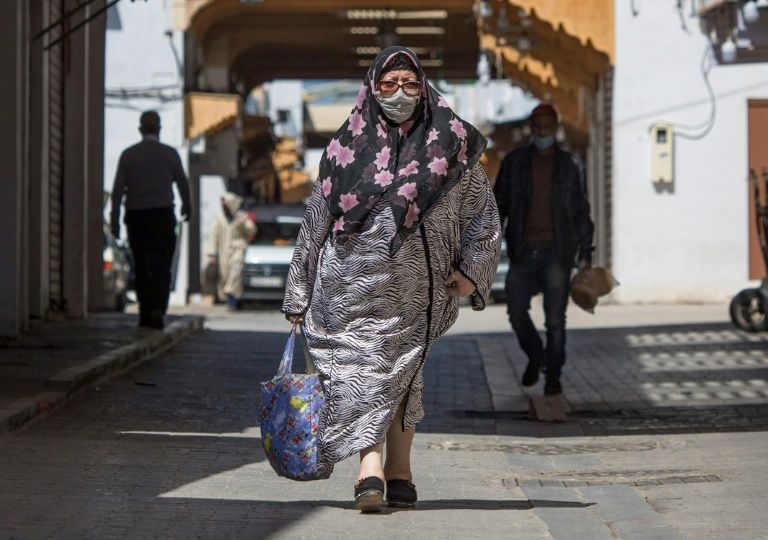Europe to reopen borders as virus spread quickens in Africa
()
The WHO raised alarm bells over the hastening spread of the virus in Africa, while highlighting that the continent has just a tiny proportion of the world’s infections. ©AFP FADEL SENNA
The European Union firmed up plans to reopen internal borders on Thursday, as the World Health Organization warned the pandemic was accelerating in Africa and US stocks plunged on coronavirus fears.
The European Commission recommended that the 27 EU members fully reopen their frontiers with each other on June 15 and with the western Balkans from July 1.
Europe’s borders with the world beyond will open more gradually after that — and only to countries where the pandemic is seen as under control.
The United States, which has the world’s highest number of deaths and infections, marked a grim new milestone as recorded cases surged past two million Thursday.
The virus and the lockdowns have caused a spike in unemployment in the US — 44.2 million forced out of jobs since mid-March — and wreaked havoc on the world economy.
Treasury Secretary Steven Mnuchin said the US economy would be reopened even if there was a second wave of infections as Wall Street stocks nosedived with revived worries about coronavirus and about excessive equity prices produced the worst session since March.
“If you shut down the economy, you’re going to create more damage,” Mnuchin said.
The US was not the only nation recording a grim milestone on Thursday — Russia passed 500,000 confirmed cases and Iran said 180,000 had been infected there.
The death toll in Latin America passed 70,000 fatalities on Wednesday — more than half of which were in Brazil.
And the WHO raised alarm bells over the hastening spread of the virus in Africa, while highlighting that the continent has just a tiny proportion of the world’s infections.
“It took 98 days to reach the first 100,000 cases, and only 18 days to move to 200,000 cases,” said WHO’s Matshidiso Moeti.
– ‘International travel is key’ –
In all, the novel coronavirus has killed almost 420,000 people and infected more than seven million since the outbreak emerged in China last December, according to an AFP tally of official sources.
The epidemic, along with economic and social lockdowns imposed by governments to contain its spread, has also left economic devastation in its wake.
The Organisation for Economic Cooperation and Development revealed Thursday that in the first three months of 2020, the G20 major economies shrank by 3.4 percent.
This is the largest decline since records began in 1998, with the steepest decline in China, where the economy shrank by 9.8 percent.
Against this gloomy backdrop, European countries — where figures suggest the outbreak is past its peak — are keen to get business moving again, particularly in the tourism sector.
“International travel is key for tourism and business, and for family and friends reconnecting,” EU home affairs commissioner Ylva Johansson said, adding that it was time “to make concrete preparations”.
Though travel from outside Europe is still restricted, within the bloc many countries — especially those dependent on tourism — have begun to relax bans on “non-essential” visits.
On Italy’s Adriatic coast, German and Austrian families are once more grabbing the sunbeds — a handful of families arriving at the Cavalieri Palace hotel in Venice.
“We really feel safe in this hotel. They are doing a very good job. Everybody follows the rules,” said German tourist Simone Freitag, her sunglasses perched on her head as she looked out to sea.
The Liga, meaarted in Spain with the first match to kick off since March 10 being played behind closed doors.
But life is unlikely to return to normal anywhere in the world until a vaccine or treatment is found.
Brazilian officials said on Thursday they had reached a deal with a Chinese firm to produce vaccine, if clinical trials proved it was effective.
“This agreement would allow us to produce at large scale and immunise millions of Brazilians,” said Sao Paulo governor Joao Doria.
– ‘Fight is not over’ –
In Geneva, the famous lakefront fountain that had been switched off during the lockdown was returned to service in the presence of international health officials.
“Reigniting the Jet d’Eau today is a celebration of Geneva’s success,” said WHO chief Tedros Adhanom Ghebreyesus.
“But the fight is not over. Most people remain susceptible to this virus and the threat of resurgence remains very real.”
Ukraine on Thursday reported an “alarming” rise in cases, after a daily record of 689 new infections and outside Europe in countries like India, fear is rife.
In New Delhi, exhausted doctors at the Max Smart Super Speciality Hospital said they may not be able to cope if the easing of a lockdown that once curbed the movement of 1.3 billion sees a surge in cases.
“We don’t know when this is going to peak,” Dr Deven Juneja told AFP.
“All of us are hoping for the best, but we are mentally and physically prepared for the worst.”
burs-jxb/har
Dave CLARK with AFP bureaus
(AFP)
Disclaimer: Validity of the above story is for 7 Days from original date of publishing. Source: AFP.


